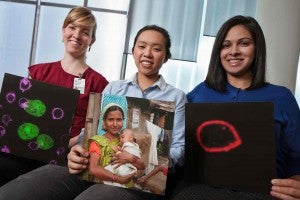Research Training

Above (l-r): Infectious Diseases post-doctoral fellow Katherine Ralston; UVA graduate student Nona Jiang; ID clinical fellow Poonam Korpe, MD. They participated in a study conducted by Bill Petri’s lab of mother-infant cryptosporidiosis in Bangladesh.
UVA’s Infectious Diseases Fellowship Program provides a rich interdisciplinary experience in ID research, with the aim of preparing fellows for careers as independent investigators on medical school faculties. Preceptors are carefully chosen to maximize opportunities for interactions between clinicians and basic scientists.
The entire first year of the fellowship program is devoted to research, with no inpatient or outpatient clinical responsibilities. This allows for more rapid development of research skills and independent research programs, and lead to more productive research during the clinical years of training.
Each fellow develops a research program under the guidance of one or more faculty members from the Division of Infectious Disease or another department (e.g. Microbiology, Public Health Sciences, etc.). Fellows are mentored in all phases of research, including project definition, experimental design, and interpretation of data. Toward the end of the fellowship, as trainees prepare to establish careers as independent investigators, they are expected to write grant applications for grant programs such as the Mentored Clinical Scientist Development award. With this rigorous training, fellows are given the best chance to succeed as academic infectious disease physicians.
Career Planning
The program offers several forums in which trainees can consider and plan their careers beyond completion of the fellowship. Annual meetings with the fellowship program director and the division chief provide an opportunity to discuss career goals and plans for achieving them. A yearly “Research Planning for Fellows” meeting, led by ID’s Eric Houpt, offers another forum in which issues related to planning of experiments, grant-writing and manuscript publication are discussed and overall progress assessed, to facilitate successful completion of these tasks and ensure expectations are met.
Research-Related Resources for Trainees
A strong spirit of collegiality in the Division of Infectious Diseases creates an ideal environment for the training of students and fellows, as well as junior faculty members. Our faculty tries to minimize the barriers for fellows to seek and receive help they require for research projects, and co-mentoring of students and fellows is common.
Most of the division’s research laboratories, along with its administrative offices, are housed in the Carter-Harrison Research Building (MR6), which has 50,000 sq. feet of space dedicated to immunology and infectious diseases. Labs in other locations are connected to MR6 by weatherproof walkways.
| Fellow with K’s | Current Position | K to R? |
|---|---|---|
| Bill Ciesla | Private practice Richmond | Ko8 |
| Moorman, Jonathan | Quillen College, ETSU | K08 to R01 |
| Parsons, Chris | Pardee UNC Health Care | K08 to R01 |
| Hughes, Molly | Assoc Prof UVa | K08 to R01 |
| Houpt, Eric | Professor UVa | K08 to R01 |
| Steiner, Ted | Prof, U British Columbia | K08 to R01 |
| Singh, Upinder | Chief ID Stanford | K08 to R01 |
| Moore, Chris | Assoc Prof, UVa | K08 to R01 |
| Dillingham, Rebecca | Assoc Prof, UVa | K08 |
| Peterson, Kristine, 2004 | Assoc Prof U. Wisconsin, | K23 to VDH, NIH |
| Eby, Joshua, 2006, MD, | Assoc Prof, UVa | K08 |
| Ralston, Katherine, | Assoc Prof, UC-Davis | K08 |
| Heysell, Scott | Assoc Prof, UVa | K22 (still on K) |
| Thomas, Tania | Assoc Prof, UVa | K23 |
| Madan, Rajat | Asst Prof U. Cincinnati | K08 (still on K) |
| Platts-Mills, James, 2012 | Assistant Professor UVa | K23 to Gates (still on K) |
| Archbald-Pannone, Laurie | Assoc Prof Geriatrics UVa | K23 |
| Korpe, Poonam | Asst Prof Johns Hopkins | K23 (still on K) |
| Moonah, Shannon | Assistant Professor UVa | K08 & Harold Amos (still on K) |
| Jackson, Patrick | Assistant Professor UVa | K08 |
| McManus, Kate | Assistant Professor UVa | K08 – pending NOA |
